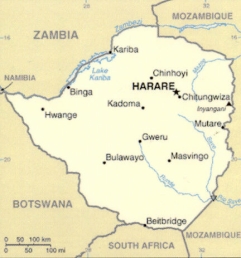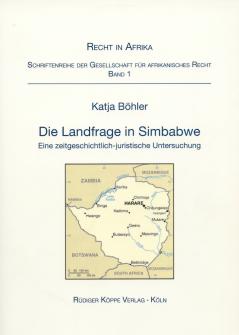

Die Landfrage in Simbabwe
Eine zeitgeschichtlich-juristische Untersuchung
Author: Katja Böhler. Series edited by: Gesellschaft für afrikanisches Recht / African Law Association (Germany).
Series: RiA Recht in Afrika Volume 1
200624 pp. Roman, 295 pp.
2 maps, chronological table, numerous tables and charts, 5 appendices: I. Wechselkurs-Entwicklung 1980–2003, II. Verteilung der Böden nach der Unabhängigkeit, III. Karten von Simbabwe, IV. Auszüge von 35 Gesetzestexten, V. Literaturverzeichnis
Text language(s): German
Format: 170 x 240 mm
680 g
Paperback
€ 59.80
Buy 'Die Landfrage in Simbabwe' as a downloadable PDF document directly from our online shop »
Order 'Die Landfrage in Simbabwe' as print edition »
At the end of the nineties Zimbabwe left the path of constitutional legality. Since the year 2000 the government adopted a radical line. It decided to disseize the white farmers without any compensations in order to change the distribution of land made in the colonial times. The farms were occupied by so called war veterans, and white judges at the Supreme Court were menaced in a very massive way and so forced to resign from office. At the same time the ripples of violence arranged by the war veterans began, and put the whole country in a civil war like state.
The present study is divided into three parts. First, the author gives a brief abstract of the distribution of land and land utilisation of Zimbabwe in precolonial times. After that the changes in the law and property system caused by the invasion of white settlers and the influences of the subsequent colonial power Great Britain is described. At the same time the gradual denial of the indigenous land rights is examined. The royal enactments, the principle decision of the Privy Council in 1919, the commission reports which constituted the basis for the enactments of the racist land laws from 1930 on, and finally the land legislation until 1979 are focused and analysed here.
In the second part the development of the land question between 1980 and 2000 is described and the causes for the emerged crises are questioned. The author's attention is in this part turned to the Lancaster House Constitution of 1979, which constituted the legal frame for the expropriation of white farmers, and for the authorisation basis of the land acquisition law of 1985.
The third part comprises the developments in the years 2000 until 2003, especially the constitution changes from April 2000, the farm occupations, the Fast-Track-Land-Reform, and the attempt of the government to legalise its illegal course through the acceptilation of laws. The situation in 2003 as well as the national and international reactions closes the examination. A comprehensive text appendix consisting of 35 wording of the law abstracts completes this study.
Under these links you will find publications on land and property law in African countries and further descriptions of languages, literature and cultures of Zimbabwe and of southern Africa:
Accompanying material:
- An Eritrean Village Reacts to Land Reform
(ISBN 978-3-89645-910-7 ) - Bitteres Gold
(ISBN 978-3-89645-821-6 ) - Brunnen und Felder
(ISBN 978-3-89645-895-7 ) - Fremde Nachbarn
(ISBN 978-3-89645-818-6 ) - Oil and the Niger Delta People in International Law
(ISBN 978-3-89645-622-9 ) - Une sécurisation foncière urbaine dans l’impasse, exemple de Bamako (Mali)
(ISBN 978-3-89645-916-9 )
Cross-reference:
- A Grammatical Sketch of Shona
(ISBN 978-3-927620-18-6 ) - Animal Husbands, Magic Horns and Water Spirits
(ISBN 978-3-89645-221-4 ) - Bridging the Unbridgeable
(ISBN 978-3-89645-275-7 ) - Democracy, Decentralisation and Poverty Reduction in Malawi
(ISBN 978-3-89645-815-5 ) - Einführung ins Schona
(ISBN 978-3-927620-04-9 ) - Great Zimbabwe
(ISBN 978-3-89645-210-8 ) - Kunst aus Zimbabwe – Kunst in Zimbabwe
(ISBN 978-3-89645-129-3 )
Reviews
Die Studie von Katja Böhler ist klar strukturiert und bündelt auf relativ engem Raum die wichtigsten Informationen zur Entwicklung der Landfrage in Simbabwe von den Anfängen bis zur Gegenwart. [...]
Die besprochene Studie beruht auf einer intensiven Auswertung von Literatur, Internetseiten, zeitgenössischen Zeitungen und Zeitschriften sowie im Untersuchungsgebiet durchgeführten Interviews. Sehr nützlich sind die Wiedergabe der sonst nur schwer zugänglichen Rechtsvorschriften auf gut 100 Seiten im Anhang des Buches und eine ausführliche Zeittafel mit den wichtigsten Daten zur Entwicklung der Landfrage in Simbabwe. Die Dissertation von Katja Böhler ist als informatives Werk allen Interessenten an einer sachlichen und ausgewogenen Analyse der Bodenreform in Simbabwe ohne Einschränkung zu empfehlen.
Harald Sippel in Recht in Afrika, 2/2006, 276-279
Die Autorin zeichnet die Entwicklung der Landfrage umfassend nach und wertet hierfür zahlreiche Erlasse, Verträge, Verfassungen und Gesetze aus. [...]
Sie nimmt zwar eine rechtlich-historische Perspektive auf das Thema ein, bietet damit aber nützliche Hintergrundinformationen auch für politikwissenschaftliche Fragestellungen.
Anke Rösener in Zeitschrift für Politikwissenschaft, 3/2007, 968
Es ist das Verdienst der Berliner Juristin, jedes einzelne Landgesetz ausführlich vorzustellen und die damit verbundenen Kontroversen zu erläutern. Ihre differenzierte Auseinandersetzung mit verfassungsrechtlichen Fragen und ihre Analyse des politischen Scheiterns der Mugabe-Regierung an der Landreform bieten eine erkenntnisreiche Lektüre.
Rita Schäfer in afrika süd, 6/2007, 42
| « back | Print version | [top] |
 Books
Books Audio
Audio Biographies
Biographies Series
Series Festschrifts
Festschrifts Journals
Journals